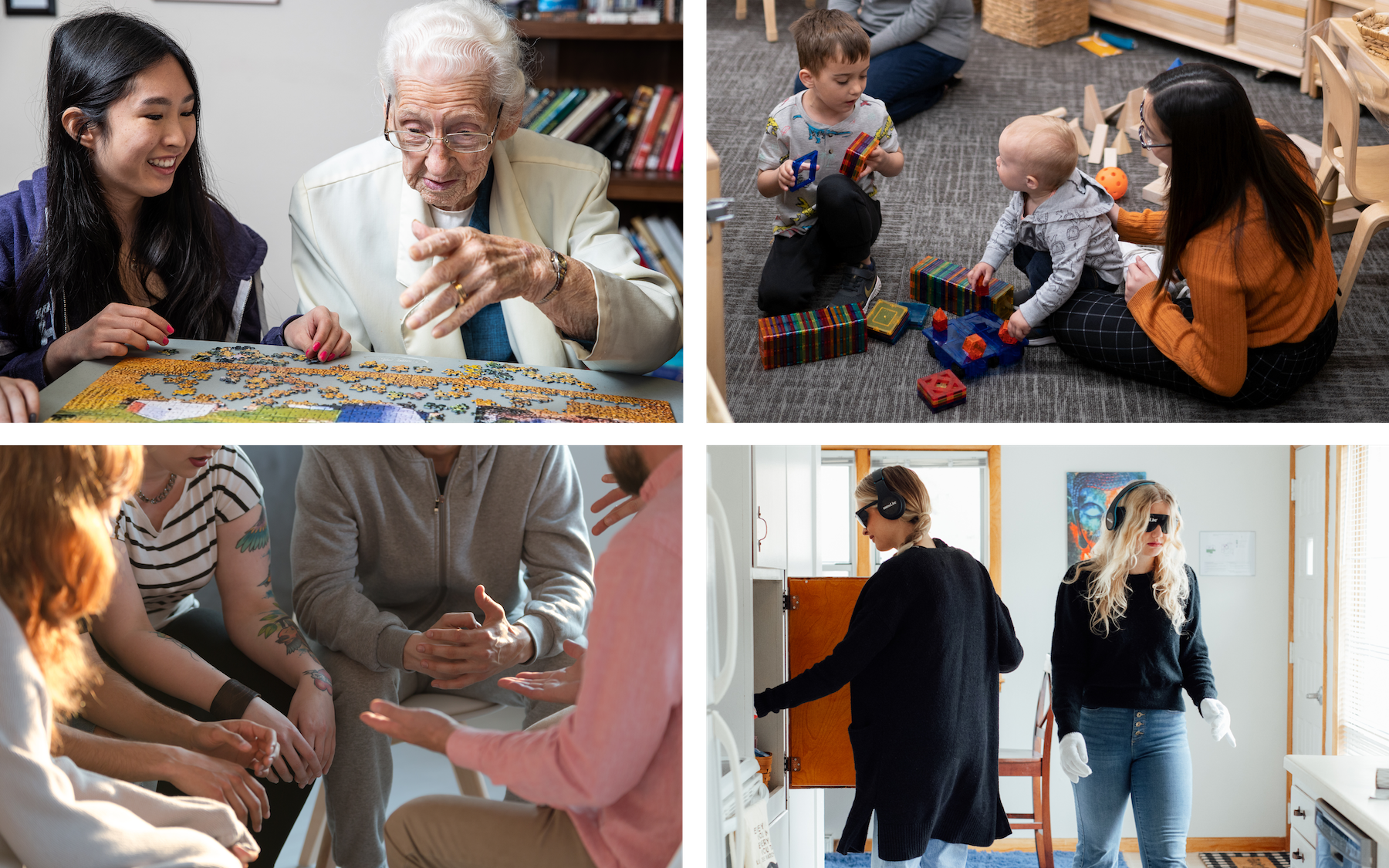Support Across the Lifespan
DEPARTMENT OF FAMILY, AGING & COUNSELING
The reorganized Department of Family, Aging and Counseling offers new opportunities for students to focus on the health and well-being of families, communities and individuals across the lifespan.
Each of the programs in the department — including undergraduate degrees in family services and gerontology, as well as a graduate counseling degree and an online, individual studies program for human services — were formerly offered through the School of Applied Human Sciences, which additionally housed the university’s textiles and apparel and interior design programs.

By narrowing the scope of the department and moving it within the new School of Health and Human Sciences, the programs have found an elevated awareness to their paths of study and career potential.
William Henninger, head of the Department of Family, Aging and Counseling, shared that the shift provides for more focused majors that work well in tandem.
It allows us to have a cohesive story around majors in health and human sciences. That drives how we view ourselves.
The department’s undergraduate programs in family services and gerontology provide a strong foundation for family dynamics and healthy aging, preparing students for future careers or advanced education across a variety of fields and placements.
“The family services major focuses largely on the application of the skills we teach,” Henninger said. “We want to train students to go out into the field and work.”
The gerontology major offers two tracks: social sciences and long-term care administration. Approximately half of UNI gerontology students work in nursing homes after graduation, with others working in a wide variety of senior support, education and advocacy services. The opportunities for careers in the field are certainly plentiful, from estate planning to music therapy and much more.
And it’s a great time to pursue an education in gerontology, as the need for professionals in the field of aging is growing exponentially. In fact, the demand for older adult care will be fueled by a steep rise in the number of Americans living with Alzheimer’s disease, which could nearly triple to 14 million by 2050.
UNI’s gerontology program is the only four-year degree in the subject in the state of Iowa. The program also runs the only Dementia Simulation House in the nation, which is open to the community, students, family caregivers and professionals.
The house offers an innovative hands-on learning experience where individuals use goggles, headphones and gloves to experience what it’s like to live with dementia. The purpose of the home is to educate people about Alzheimer’s and other dementias, increasing empathy for those living with dementia, and empowering care partners.
Elaine Eshbaugh, Davis Professor of Gerontology, shared that the program’s move under the newly reorganized department and school is an exciting one.
“We will be able to work more closely with programs like nursing, exercise science and public health,” she said.
Students in the department’s graduate counseling program, which was purposely designed for working professionals, have the option of pursuing a school or clinical mental health specialization. The 60-hour program is accredited by the Council for Accreditation of Counseling and Related Programs and is intentionally designed over three years to create optimal development of counseling professionals.
During the first two years of the program, courses are offered in a traditional in-person format with mandatory summer courses in a flexible format (in-person or online).
The program’s third year is digitally delivered to allow students flexibility in clinical placements in or outside of the Cedar Valley.
The Department of Family, Aging and Counseling also oversees the Patricia A. Tomson Center for Violence Prevention, which was established at UNI in 2011 to enable schools, victim service agencies, law enforcement and institutions to implement best practices in violence prevention.
The center provides financial support to qualifying CSBS students who are engaged in internships with non-profit organizations, associations or government entities addressing interpersonal violence.
Ultimately, the Department of Family, Aging and Counseling allows for a number of hands-on learning experiences while keeping the focus of preparing students to enter careers that help others at its heart.
LEARN MORE ABOUT THE DEPARTMENT OF FAMILY, AGING & COUNSELING
UNI’s Family Services major was the first in Iowa to be a designated and approved Certified Family Life Educator (CFLE) program by the National Council on Family Relations
MA in Clinical Mental Health Counseling was the first accredited program in the nation
